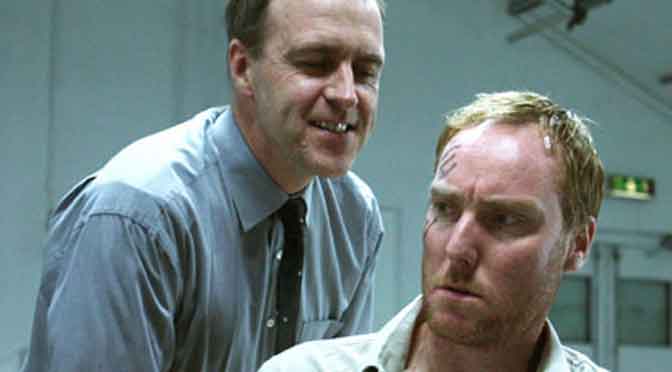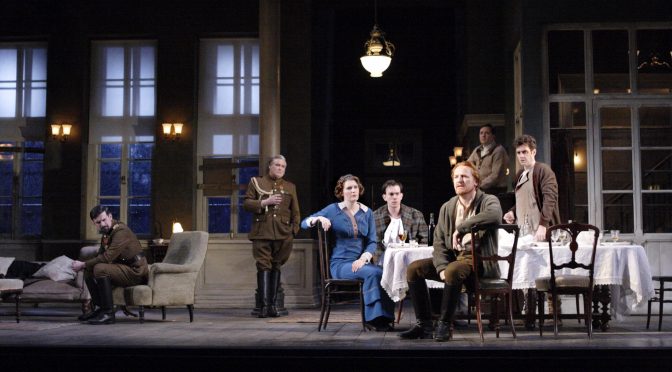Designer Bunny Christie has done such an exemplary job on the sets for The White Guard – Andrew Upton’s adaptation of Mikhail Bulgakov’s masterpiece depicting the mayhem of the Russian Civil War, now showing at The National Theatre – that it makes sense to tell the story through her work.
Set first in the Turbin family household we’re drawn into the close, communal nature of their life. They are members of the Tsarist White Guard who protect a puppet politician installed by the Germans to control the Ukraine in the winter of 1918. The set gracefully retracts to the back of the Lyttelton stage, becoming distant and threatened as the story moves to the Hetman’s decrepit palace just as he is about to flee, with the vast, cold room depicting the corruption and chaos of the state. Next we’re plunged into to scenes of war; the barracks of the rebelling Nationalists, ready to fight both the Germans and the approaching Bolsheviks, and a school gymnasium commandeered by the White Guard who have come to appreciate that they have become an anachronism in a political vacuum.
This is a family drama set in turbulent times. Daniel Flynn plays elder brother Alexei Turbin with determination. He is a man of great courage but also a thinking soldier. Flynn manages to show bravery but also fear about the future. Younger brother Nikolai is played by Richard Henders with great charm. In managing to convey ambiguity over whether Nikolai idolises his brother or the military more his fate becomes deeply moving. Justine Mitchell, cast as their sister Elena, is the only female role in the play. She manages this complex role superbly acting not just as sister but mother, friend and lover to her brother’s comrades visiting the home.
If this all sounds very worthy don’t be put off. True, The White Guard is a fascinating investigation into the impact of war and offers insight into politics. Yes, it shows the power of ideas and identity to sculpt our lives and behaviour, but Upton’s new version of the play deals lightly with all this and saves the work from any pomposity. Possibly because Bulgakov’s own adaption was so heavily censored, Upton has a sense of freedom. His writing is delightful, fast-paced, down to earth and comical with plenty of force when it comes to dramatic moments.
Best of all he has given a script that the cast can revel in and director Howard Davies uses his great experience to provide them with room and inspiration enough to result in performances that seem uniformly fresh and natural.
The visitors to the Turbin home all seem to fall in love with Elena. It isn’t just because she is the only woman around – Mitchell’s performance shows a vitally alive, captivating woman. Paul Higgins and Nick Fletcher as Captains in The Guard both convince as soldiers under pressure and men in love. Pip Carter who plays Larion, a visiting student who provides an alternative to the militarism around him, has some great comic moments. Kevin Doyle as Elena’s husband and deputy war minister serves as an effective foil to the many admirable men in her life with his amusing incompetence and self-obsession. Elena refers to them all as her boys – but the man of the piece is Conleth Hill.
Hill plays Lieutenant Shervinsky. We see him as the perfect charmer wooing Elena. She and the audience can’t help but laugh with him. As aide-de-camp to the Hetman, he is superior towards the footman, a fantastic little role Barry McCarthy excels in, and deferential to his boss, played by Anthony Calf in great form. As the political turmoil increases we see his character adapt to survive, winning the love of Elena and revealing a deep sincere affection. His character is the man happiest to adapt to the future that the White Guard feared. His portrayal is so charismatic we are happy that he can do so. With him around the Russian Revolution becomes a lot more interesting.
Until July 7 2010
www.nationaltheatre.org.uk
Photo by Catherine Ashmore
Written 26 March 2010 for The London Magazine


